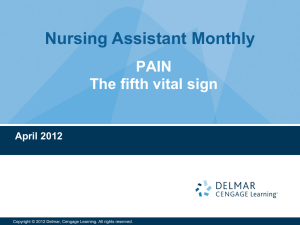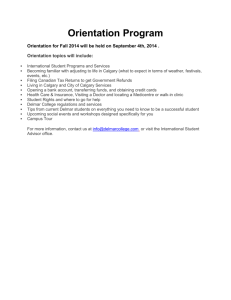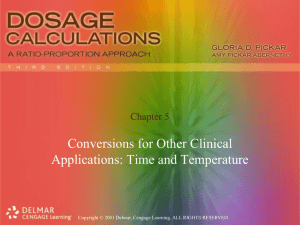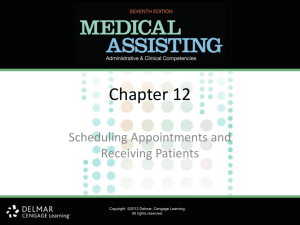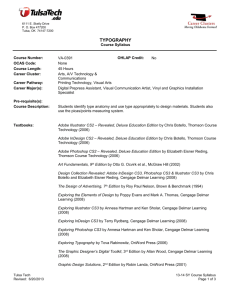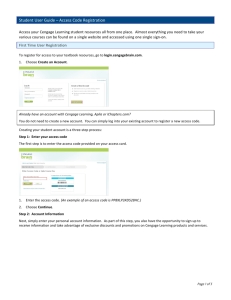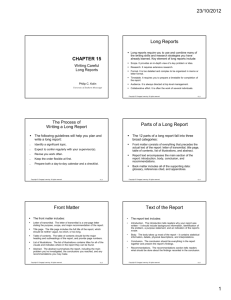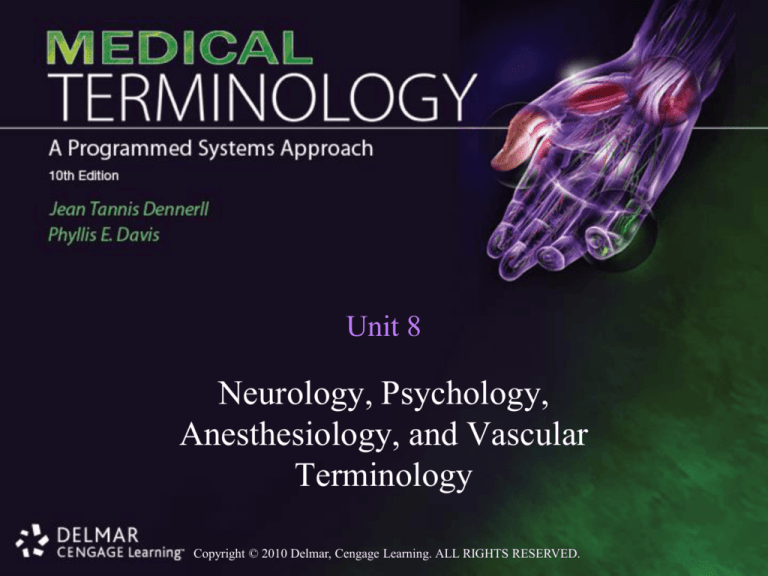
Unit 8
Neurology, Psychology,
Anesthesiology, and Vascular
Terminology
Copyright © 2010 Delmar, Cengage Learning. ALL RIGHTS RESERVED.
Neurology
• Study of anatomy, physiology, and pathology
of nervous system
• Components of nervous system:
–
–
–
–
Brain
Spinal cord
Cranial nerves
Spinal nerves
Copyright © 2010 Delmar, Cengage Learning. ALL RIGHTS RESERVED.
Neur/o
• neur/o = combining form
• Examples:
–
–
–
–
neur/on = nerve cell
neur/o/blast = embryonic nerve cell
motor neur/on = nerves that control muscle movement
neur/o/logist = specialist who studies nervous system
disorders
Copyright © 2010 Delmar, Cengage Learning. ALL RIGHTS RESERVED.
Central Nervous System Pathways
• Afferent nerves
– Carry nerve impulses from receptors in body toward central
nervous system (CNS)
• Efferent nerves
– Carry nerve impulses away from CNS to effectors in body
• E.g., muscles, nerves
Copyright © 2010 Delmar, Cengage Learning. ALL RIGHTS RESERVED.
Easily Confused Terms
Term
afferent
efferent
affect
effect
Meaning
inflowing toward center
outflowing away from center
to have influence upon
result of consequence of action
Copyright © 2010 Delmar, Cengage Learning. ALL RIGHTS RESERVED.
Easily Confused Terms
Term
accept
except
affusion
effusion
Meaning
include or bring toward
exclude and keep away or reject
pouring upon
escaping of fluid from its normal place
Copyright © 2010 Delmar, Cengage Learning. ALL RIGHTS RESERVED.
Terms with neur/o
• neur/o/surgeon = physician trained to perform
surgery on structures of nervous system
• neur/o/pathy = generalized disease condition
of nerves
• neur/algia = pain along course of nerve
Copyright © 2010 Delmar, Cengage Learning. ALL RIGHTS RESERVED.
Terms with neur/o
• neur/itis = inflammation of nerve
• neur/oma = nerve tumor
• neuro/o/myel/itis = inflammation of nerves
and spinal cord
Copyright © 2010 Delmar, Cengage Learning. ALL RIGHTS RESERVED.
Nervous System Procedures
• neur/o/lysis = destruction of nerve tissue
• neur/o/plasty = surgical repair of nerves
• neur/o/tripsy = surgical crushing of nerve
Copyright © 2010 Delmar, Cengage Learning. ALL RIGHTS RESERVED.
Autonomic Nervous System (ANS)
• Functional organization of nervous system that
responds to stress
• sym/path/etic nerves = send signals to
prepare body for fight or flight in response to
danger
• para/sym/path/etic nerves = return body to
normal resting state
Copyright © 2010 Delmar, Cengage Learning. ALL RIGHTS RESERVED.
Terms with myel/o
• myel/o = combining form for spinal cord and
bone marrow
• Examples:
–
–
–
–
myel/o/blast = bone marrow germ cell
myel/o/cyte = immature bone marrow cell
myel/o/cyt/ic = pertaining to myelocytes
myel/o/cele = herniation of spinal cord
Copyright © 2010 Delmar, Cengage Learning. ALL RIGHTS RESERVED.
Suffix: -plasia
• -plasia = condition of growth or development
– Indicates change in form of structure or abnormal number
of cells
• Examples:
– a/plasia = lack of development
– dys/plasia = poor or defective development
Copyright © 2010 Delmar, Cengage Learning. ALL RIGHTS RESERVED.
Suffix: -plasia
• Examples:
– myel/o/dys/plasia = defective formation of spinal cord
– chondr/o/dys/plasia = defective formation of cartilage
– oste/o/chondr/o/dys/plasia = defective formation of bone
and cartilage
– hyper/plasia = overgrowth or too much development
– hypo/plasia = underdevelopment
Copyright © 2010 Delmar, Cengage Learning. ALL RIGHTS RESERVED.
Psychology
• psych/o/logy = study of mind, mental
processes, and human behavior
• psych/o = combining form
• Example:
– psych/o/logist = scientist or therapist who works in field of
psychology
Copyright © 2010 Delmar, Cengage Learning. ALL RIGHTS RESERVED.
Psychiatry
• psych/iatry = field of medicine that studies
and deals with mental and neurotic disorders
• psych/iatrist = specialist physician who treats
mental disorders
Copyright © 2010 Delmar, Cengage Learning. ALL RIGHTS RESERVED.
Psychological Disorders
• neuro/sis = condition in which patient knows
real from unreal but exaggerates reality
– Also known as psych/o/neur/osis
• Phobia
– Neurosis characterized by extreme or irrational fear of
something
Copyright © 2010 Delmar, Cengage Learning. ALL RIGHTS RESERVED.
Psychological Disorders
• Obsessive compulsive disorder
– Neurosis that can result in:
• Repeated distressing, anxiety-producing thoughts
• Uncontrollable, repeated actions
• Fear of illness and need to wash hands, clean house, and wear mask
against germs
Copyright © 2010 Delmar, Cengage Learning. ALL RIGHTS RESERVED.
Psychological Disorders
• Conversion reaction
– Neurosis characterized by bodily symptoms accounted for
by psychological conflict
• Rather than physical causes
• psych/osis = severe mental condition marked
by loss of contact with reality and having
delusions or hallucinations
Copyright © 2010 Delmar, Cengage Learning. ALL RIGHTS RESERVED.
Psychological Disorders
• psych/o/sexual = mental disorder related to
sexual function
• psych/o/somatic = disorder having physical
symptoms but originating from mental or
emotional causes
Copyright © 2010 Delmar, Cengage Learning. ALL RIGHTS RESERVED.
Psychological Treatments
• psych/o/therapy = process of healing mental
disorders using words, art, drama, or
movement to express feelings
• psych/o/trop/ic medication = used to alter
emotions or behavior to lower anxiety
Copyright © 2010 Delmar, Cengage Learning. ALL RIGHTS RESERVED.
Pharmacology
• pharmac/o = drugs or medicine
• pharmac/ist = person licensed to dispense
prescription and nonprescription medications
from pharmacy
Copyright © 2010 Delmar, Cengage Learning. ALL RIGHTS RESERVED.
Pharmacology
• neur/o/pharmac/o/logy = study of drugs that
affect nervous system
• psych/o/pharmac/o/logy = study of drugs that
act on mind and nervous system
Copyright © 2010 Delmar, Cengage Learning. ALL RIGHTS RESERVED.
Narcotics
• Can cause addition
– Only prescribed by physicians with narcotic license
• narc/o = combining form for sleep
• narc/o/tics = substances that produce sleep,
pain relief, and near-unconsciousness
– E.g., opium, codeine, morphine
Copyright © 2010 Delmar, Cengage Learning. ALL RIGHTS RESERVED.
Terms with narc/o
• narc/osis = condition induced by narcotics
• narc/o/lepsy = disorder characterized by
seizures or attacks of sleep
– Causes:
• Cerebroma, cerebral arteriosclerosis, paresis, and brain disease
– -lepsy = seizure
Copyright © 2010 Delmar, Cengage Learning. ALL RIGHTS RESERVED.
Epilepsy
• Seizure disorder in which brain suddenly and
briefly changes how it works
– Previously classified by types of seizures
• Petit mal and grand mal
– Now described by part of brain involved
• Partial and general
– Treatment:
• Medication and surgery
Copyright © 2010 Delmar, Cengage Learning. ALL RIGHTS RESERVED.
Arteries
• Blood vessels that carry blood away from heart
• arteri/o = combining form
• Examples:
–
–
–
–
arteri/o/scler/osis = hardening of arteries
arteri/o/malcia = softening of arteries
arteri/o/fibr/osis = fibrous condition of arteries
arteri/ectasia = arterial dilation
Copyright © 2010 Delmar, Cengage Learning. ALL RIGHTS RESERVED.
Terms with ather/o
• ather/o = combining form meaning fatty or
porridge-like
• Examples:
– ather/oma = fatty plaque that accumulates on inside wall
of artery
– ather/ectomy or end/arter/ectomy = excision of atheroma
• Most commonly performed on carotid artery
Copyright © 2010 Delmar, Cengage Learning. ALL RIGHTS RESERVED.
Atherosclerosis
• ather/o/scler/osis = condition of hardening of
arteries due to atheroma
• Can lead to heart attacks and strokes
• Most common cause of angina pectoris
– Chest pain
Copyright © 2010 Delmar, Cengage Learning. ALL RIGHTS RESERVED.
Atherosclerosis
• Symptoms:
– Fatty streaks in carotid arteries
• Prevention:
– Normal cholesterol levels, increase in high density
lipoprotein (HDL), decrease in low density lipoprotein
(LDL), smoking cessation, and increase in physical activity
Copyright © 2010 Delmar, Cengage Learning. ALL RIGHTS RESERVED.
Hematology
• hem/o and hemat/o = combining terms for
blood
• Examples:
– hemat/o/logy = study of blood
– hemat/o/logist = person who specializes in science of
blood
– hem/angi/o/blast = embryonic blood vessel cell
Copyright © 2010 Delmar, Cengage Learning. ALL RIGHTS RESERVED.
Hematology
• Examples:
–
–
–
–
hem/angi/oma = benign tumor of blood vessel
hem/arthr/osis = blood in joint
hemat/o/phobia = abnormal fear of blood
hemato/o/lysis = destruction of blood cells
Copyright © 2010 Delmar, Cengage Learning. ALL RIGHTS RESERVED.
Hemangioma
Copyright © 2010 Delmar, Cengage Learning. ALL RIGHTS RESERVED.
Blood Tests
• hem/o/globin = protein pigment in RBCs that
carries oxygen and carbon dioxide
• hem/o/globin blood test (HGB) =
measurement to detect anemia
– Normal average for women:
• 12 to 14 grams
Copyright © 2010 Delmar, Cengage Learning. ALL RIGHTS RESERVED.
Blood Tests
• hemat/o/crit = measures percent of formed
elements compared to total volume of blood
– Formed elements
• Blood cells
– Normal average range:
• 36 to 45 percent
Copyright © 2010 Delmar, Cengage Learning. ALL RIGHTS RESERVED.
Terms with thromb/o
• thromb/o = combining form for blood clot
• thrombus = medical term for blood clot
• thrombi = plural form
Copyright © 2010 Delmar, Cengage Learning. ALL RIGHTS RESERVED.
Terms with thromb/o
• Examples:
–
–
–
–
–
thromb/o/cyte = cell that aids clotting
thromb/o/cyt/o/penia = lack of cells that aid clotting
thromb/osis = condition of forming thrombus
thromb/o/genic = pertaining to formation of a thrombus
thromb/oid = resembling thrombus
Copyright © 2010 Delmar, Cengage Learning. ALL RIGHTS RESERVED.
Thrombi Procedures
• thromb/ectomy = excision of thrombus
• thromb/o/lysis = destruction of thrombus
Copyright © 2010 Delmar, Cengage Learning. ALL RIGHTS RESERVED.
Effects of Thrombi
• Thrombus may occlude (block) vessel
– Results in:
• Stoppage of blood supply and infarct of tissue
– Infarct = necrosis = death
• my/o/cardi/al in/farct/ion = death of heart
muscle
• cerebr/al in/farct/ion = occlusion of artery
that supplies blood to brain
Copyright © 2010 Delmar, Cengage Learning. ALL RIGHTS RESERVED.
Embolus
• Thrombus or piece of thrombus traveling
through blood vessels to other parts of body
– Can cause block in vessel
Copyright © 2010 Delmar, Cengage Learning. ALL RIGHTS RESERVED.
Veins
• Vessels that carry blood to heart
• phleb/o, ven/o, and ven/i = combining forms
• Example:
– ven/ous = pertaining to veins
Copyright © 2010 Delmar, Cengage Learning. ALL RIGHTS RESERVED.
Veinal Procedures
•
•
•
•
phleb/ectomy = excision of vein
phleb/o/pexy = surgical fixation of vein
phleb/ectasia = venous dilation
phleb/o/plasty = surgical repair of vein
Copyright © 2010 Delmar, Cengage Learning. ALL RIGHTS RESERVED.
Veinal Procedures
• phleb/o/tomy = incision into vein
• ven/i/puncture = incision into vein to obtain
blood sample
• phleb/o/graphy = process of obtaining x-ray
of vein
Copyright © 2010 Delmar, Cengage Learning. ALL RIGHTS RESERVED.
Vessels
• angi/o = combining form
• Examples:
– angi/o/blast = germ cell from which vessels develop
– angi/o/graphy = process of obtaining x-ray of vessel
– angi/o/gram = image of vessel
Copyright © 2010 Delmar, Cengage Learning. ALL RIGHTS RESERVED.
Vessel Procedures
• angi/o/scopy = process of using looking
device to examine vessel
• angi/ectasia = dilation of vessel
• angi/o/lysis = destruction or breaking down of
vessels
• angi/o/plasty = repair of vessel
Copyright © 2010 Delmar, Cengage Learning. ALL RIGHTS RESERVED.
Anesthesiology
• esthesia = feeling or sensation
• Examples:
– an/esthesi/a = without or lack of sensation
– an/esthesi/o/logy = branch of medicine concerned with
anesthesia
– an/esthesi/o/logist = physician specialist in anesthesia
Copyright © 2010 Delmar, Cengage Learning. ALL RIGHTS RESERVED.
Anesthesiology
• Examples:
– an/esthet/ist = person who administers anesthetic agents
• Novocaine
– Local anesthetic agent that removes sensation in specific area
– dys/esthesi/a = impairment of sensation
– hypo/esthesi/a = impaired sensation
– hyper/esthesi/a = oversensitivity to pain
Copyright © 2010 Delmar, Cengage Learning. ALL RIGHTS RESERVED.
Pain
• alges = combining form
• Examples:
– alges/ia = extreme oversensitivity to pain
• Synonym for hyperesthesia
– alges/ic = pertaining to pain
– alges/i/meter = instrument used to measure pain
Copyright © 2010 Delmar, Cengage Learning. ALL RIGHTS RESERVED.
Pain Conditions
• an/alges/ia = condition without pain
• par/alges/ia = abnormal pain
• par/alg/ia = abnormal pain
Copyright © 2010 Delmar, Cengage Learning. ALL RIGHTS RESERVED.
Muscles
• my/o = combining form
• Origin
– Greek
– myon = muscle
Copyright © 2010 Delmar, Cengage Learning. ALL RIGHTS RESERVED.
Types of Muscles
1. Striated
– Skeletal
– Voluntary
– Location:
• Covers skeleton
– Function:
• Skeletal movement
Copyright © 2010 Delmar, Cengage Learning. ALL RIGHTS RESERVED.
Types of Muscles
2. Smooth
– Visceral
– Involuntary
– Location:
• Organs and vessels
– Function:
• Movement of liquids, gases, and solids
Copyright © 2010 Delmar, Cengage Learning. ALL RIGHTS RESERVED.
Types of Muscles
3. Cardiac
– Location:
• Heart
– Function:
• Maintain heartbeat
Copyright © 2010 Delmar, Cengage Learning. ALL RIGHTS RESERVED.
Animation
Click Here to Play Types of Muscle Tissue Animation
Copyright © 2010 Delmar, Cengage Learning. ALL RIGHTS RESERVED.
Types of Muscles
• Three combining forms:
– rhabd/o/my/o = striated
– leiomy/o = smooth
– my/o/cardi/o = heart
Copyright © 2010 Delmar, Cengage Learning. ALL RIGHTS RESERVED.
Muscle Conditions
• my/o/pathy = any muscle disease
• cardi/o/my/o/pathy and my/o/cardi/o/pathy
= heart muscle disease
• my/o/spasm = spasm of muscle
• my/asthenia gravis = autoimmune disease
that causes muscle weakness
Copyright © 2010 Delmar, Cengage Learning. ALL RIGHTS RESERVED.
Muscle Conditions
• my/o/scler/osis = hardening of muscle tissue
• my/o/fibr/oma = fibrous muscle tumor
• my/o/lip/oma = muscle tumor containing fatty
elements
• my/oid = resembling muscle
Copyright © 2010 Delmar, Cengage Learning. ALL RIGHTS RESERVED.
Measuring Muscle Activity
• electr/o/my/graphy (EMG) = measures and
creates image of muscle activity using surface
and needle electrodes
• electr/o/eur/o/my/graphy = similar diagnostic
tool that measures nerve function
Tests used to confirm carpal tunnel syndrome
Copyright © 2010 Delmar, Cengage Learning. ALL RIGHTS RESERVED.
Kinesiology
• kinesi/o/logy = study of muscular body
movements
• kinesi/algia = pain on movement
• brady/kinesia = slowness of movement
• Exercise physiologist
– Person who studies science of how body moves
Copyright © 2010 Delmar, Cengage Learning. ALL RIGHTS RESERVED.
Prefix: para• para- = near or abnormal
• Examples:
–
–
–
–
–
–
para/nephr/itis = inflammation near kidney
para/salping/itis = inflammation near fallopian tubes
para/hepat/itis = inflammation near liver
para/oste/o/arthr/o/pathy = disease near bone and joint
para/noid = delusions of persecution
par/esthesia = abnormal touch sensation
Copyright © 2010 Delmar, Cengage Learning. ALL RIGHTS RESERVED.
Paralysis
• para/lysis = loss of muscle function and
sensation
• para/plegia = paralysis of lower body
Copyright © 2010 Delmar, Cengage Learning. ALL RIGHTS RESERVED.
Rupture
• -rrhexis = suffix meaning rupture
• Terms for rupture:
–
–
–
–
–
cardio/o/rrhexis = of heart
angi/o/rrhexis = of vessel
arteri/o/rrhexis = of artery
phleb/o/rrhexis = of vein
metr/o/rrhexis and hyster/o/rrhexis = of uterine tissues
Copyright © 2010 Delmar, Cengage Learning. ALL RIGHTS RESERVED.
Paroxysm
• Symptom coming on suddenly
– Spasm
• paroxysm/al = adjectival form
• Paroxysmal nocturnal dyspnea
– Sudden onset of shortness of breath at night
Copyright © 2010 Delmar, Cengage Learning. ALL RIGHTS RESERVED.

